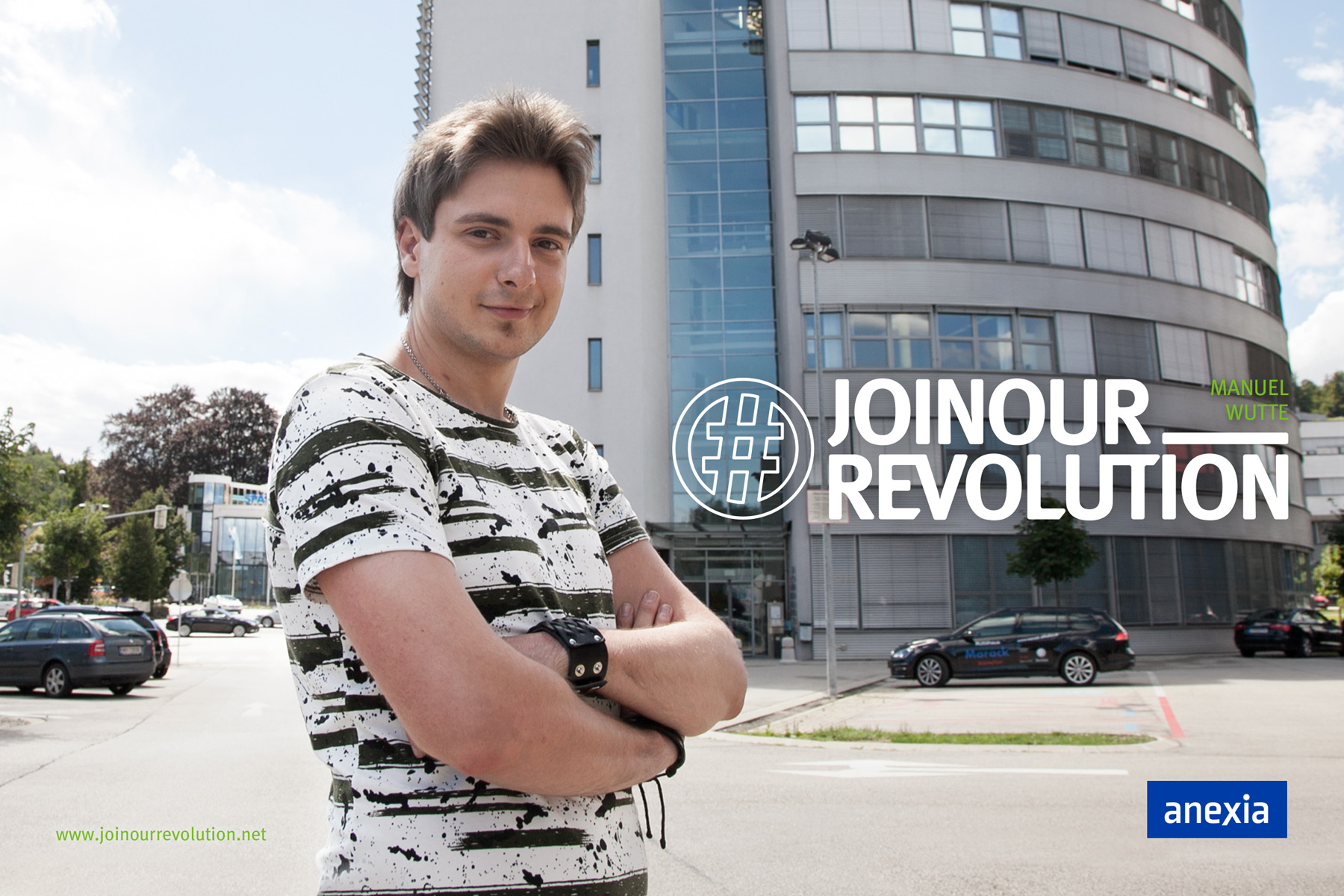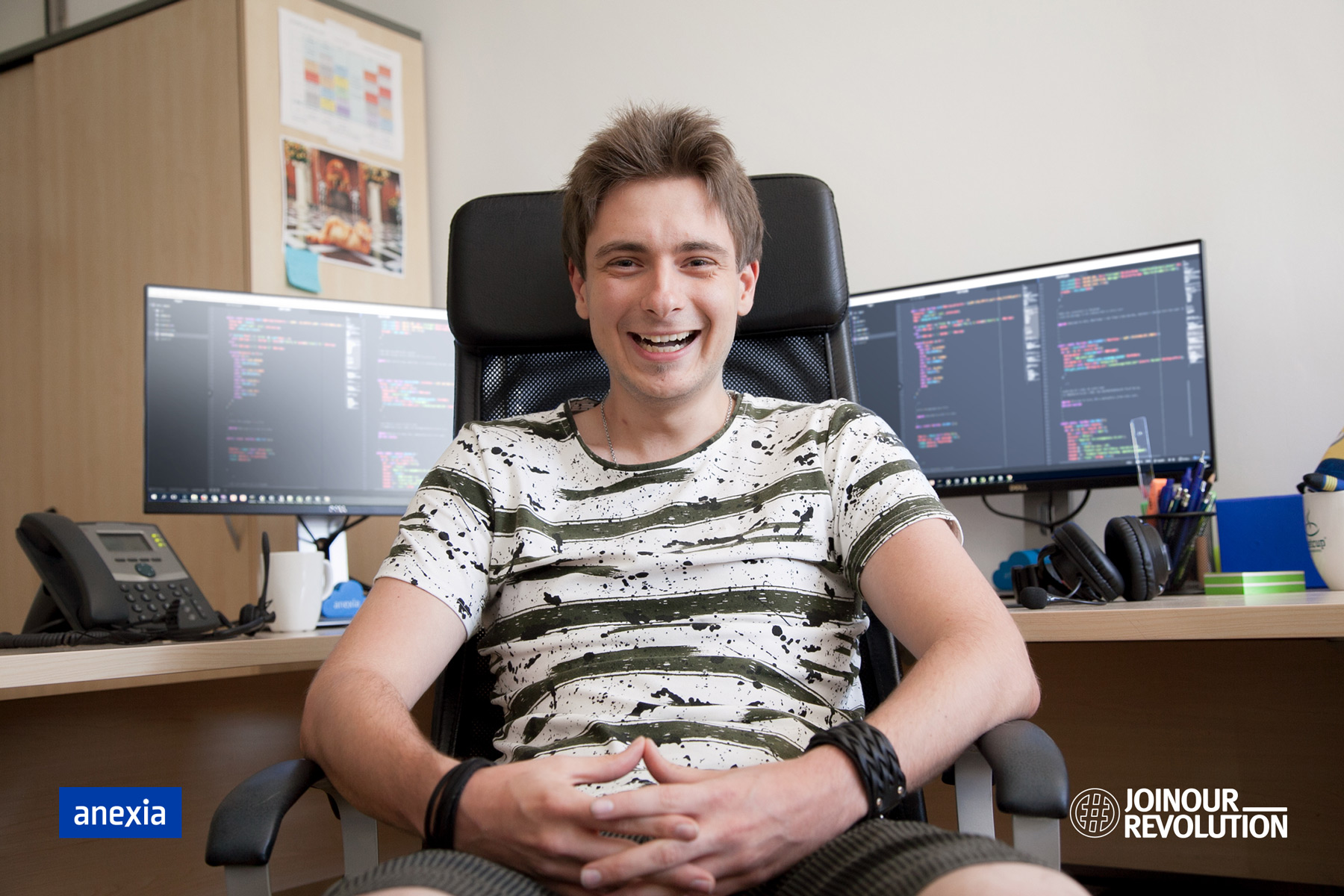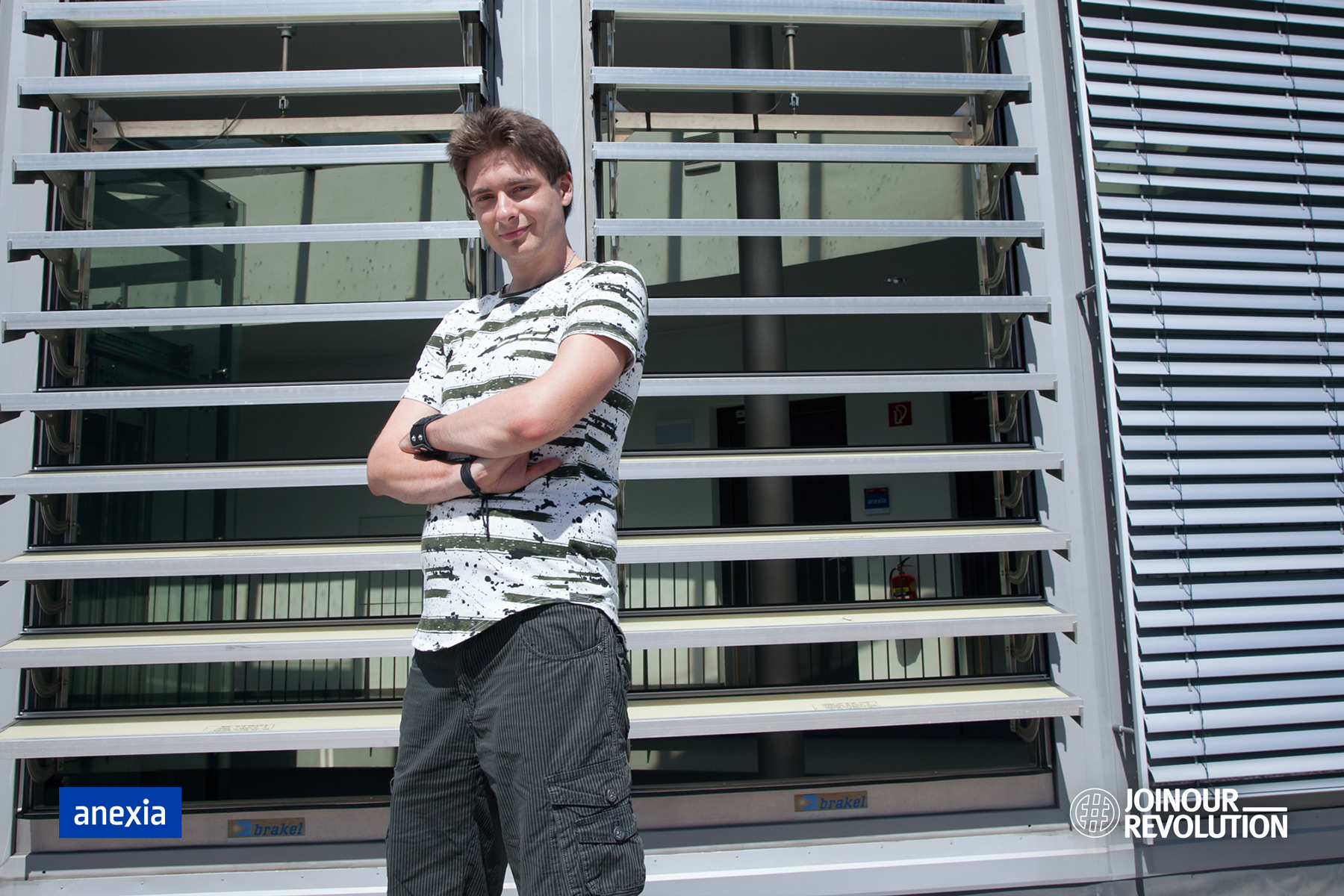Manuel Wutte: Dream job software developer at Anexia
What do you think a programmer is like? Withdrawn, rather shy, and not very social? Manuel is the exact opposite. He is not an unknown face, because he writes our tutorials on CodeIgniter. The experiences he shares in the tutorials is partially self-taught and expanded through work and a lot of practice. This software developer has been working for Anexia for almost five years.
In this #joinourrevolution interview you will learn why his dream was to become a software developer at Anexia and what he likes about writing the tutorials.
Manuel, can you introduce yourself briefly?
I am Manuel, a software developer at Anexia since July 2013. In addition to the development of individual solutions, my main activities include working with the TYPO3 CMS.
What do you like about your work as a software developer?
Mainly the variety. There are always new topics and new technologies that I have to work with or have the opportunity to work with.
You’ve been at Anexia now for almost five years. That’s a relatively long time. How did you find out about Anexia?
That was actually somewhat by accident. While I was at the Technical College a professor showed me the Anexia website and also told me how a graduate of our school, Alexander Windbichler, had established the company. I was curious about it and reviewed the homepage carefully at home, and I realized quickly that “I want to join them!” I strove for this goal, and now I’m here. (Laughs)
I’ve informed myself about Anexia and realized quickly: I want to join them!
So it was your dream at school to become a software developer at Anexia?
Exactly. Anexia had a vacancy for a PHP developer at the time, and I knew that’s just what I always wanted to do. In January I finally submitted the application and was accepted shortly thereafter. The last few months I was just waiting until I was finally able to start here after my graduation.
What Technical College did you attend and what did you major in?
I attended the Technical College (HTL Mössingerstrasse) in Klagenfurt. I majored in telecommunications, with a special focus on high frequency technology. But I don’t work with it that much today. This knowledge is very helpful to me, though, in understanding the tasks and activities of the other departments at Anexia.
Did you teach yourself how to program?
Let’s put it this way, I was able to program before I started the Technical College. I started early, actually already in elementary school. Through my internships at KGKK in the area of software development and analytics, and at Klinikum Klagenfurt’s IT-Field-Support, I was able to apply my knowledge in practice and so gain some experience. So you could say that I’m very universally deployable, since I can cover quite a few spectra.
You like to share your experience and keep writing our CodeIgniter tutorials. What do you like about writing?
I keep thinking of what I used to do (and sometimes still do today): If I had a problem, I just googled the solution. I looked to see if perhaps I can find something that is close to what I actually want. It is often difficult to find something suitable for certain topics. You find a lot for some frameworks and nothing for others. Of course you’re happy if you come across something useful. In the case of the CodeIgniter tutorials I’m writing for Anexia, I work on making the tutorials not too simple, but also not too complicated – in other words, right in the middle. Many of my ideas often arise spontaneously.
For example, what could be needed right now? How could I explain this as understandably as possible and what exciting background information could I provide? Such tasks often seem complicated at first glance, but the underlying principle is usually very trivial. The surrounding data often complicates the whole thing and may even seem inscrutable to some.
What is so special about the Framework CodeIgniter?
There are many frameworks in PHP. Some have prevailed, for example, Laravel or CodeIgniter, while others have not. CodeIgniter, for example, is mainly used in the Americas. But it is becoming more relevant in our region as well. After being neglected for a long time by the actual developer and service provider, the British Columbia Institute of Technology (BCIT) basically took over CodeIgniter. The university is maintaining the framework and is actively expanding it further. The advantage of it is that CodeIgniter is relatively easy to understand, especially if you want to learn PHP, unlike, say, Laravel. The entry curve is a bit higher there as compared to CodeIgniter. For me Laravel is easy, but a beginner may well wonder how to get it to work at all. You first have to know that you will need Package Manager Composer, to make it installable in the first place and so that it can subsequently be run, and then the right configurations have to be set. With CodeIgniter it’s different. Put simply, you take all the files, copy them to a server, and it works. Due to its architecture, CodeIgniter is especially designed for shared hosting, where you usually have no influence on the server.
Among other things, you can build web applications with PHP and CodeIgniter. At Anexia we mainly do web development in the software development department. Are desktop programs dying?
I would not say they’re going entirely extinct. But web applications have the distinct advantage that they are quickly available as cloud solutions and are also very scalable, even if they are made up of hybrid frameworks, such as Electron. It would look like this: You build a web application based on Electron – but of course, this framework is just one of many that are being worked on – and then you can decide: do I want a web app now, or do I also want an Android solution, or even a native solution for Windows? Skype is based on this principle, for example. You open desktop Skype, but in principle it’s a web application at its core.
Are web applications the future, or what do you think?
They are easy to maintain. In desktop applications, you have to take care of everything yourself: What about backups? Do I have the latest version? Do I have to reinstall everything? Web applications, on the other hand, are hosted centrally, made available, and you have a fixed URL where you access them – and that’s it. In simple terms, you can elegantly shunt all the problems you would otherwise have to handle to others. (Laughs)
A common knowledge base? Luckily, we have the coffee breaks, where we can talk about our projects.
In a clichéd way people usually imagine a programmer as being rather withdrawn, but with the tutorials you share your knowledge. Is collaboration and knowledge sharing important to software developers?
Very much within the team, because you always have problems that you cannot always handle by yourself. As already mentioned, I mainly do CMS development and custom solutions. Of course, I often come across problems because I do not know how a certain component works. You either write and exchange information in chats or – I’ll say it that way right now – you have the resources directly in your own office at the desk next door. You cannot know everything; that’s just not possible. You just have to know how to find the information.
How do you manage to build a common knowledge base in the Anexia software development department?
After talking a lot about our projects during the coffee breaks, we know who is doing what. So you also find out who might already have had the same problem.
Are you also in contact with the customer a lot?
The main communication is via our project management team. However, direct customer contact sometimes also takes place during ongoing maintenance projects. Each customer has a fixed contact person who is responsible for them and their project. If this is always the same person, it is just more comfortable for the customer, because they don’t always have to explain everything again from scratch.
Do you have a stressful job?
It’s highly varied. I often have to jump back and forth between projects and don’t know where the time went, and then there are also phases where I am relatively relaxed in comparison, because there is less time pressure.
What can one learn from a software developer?
During my work as a software developer I learned to get inner peace. By now I am used to having problems crop up, but I also know that everything can be fixed.
And finally, what do you do after work in your spare time?
When I travel, for example, I am always drawn to the south, towards Italy. Of course, I am also Carinthian. (Laughs) Sun, beach, ocean – that’s totally me. Just relaxing and just doing nothing at the same time can be very nice too. In my spare time I like cycling, playing table tennis with friends or climbing. A couple of months ago some of my colleagues and I started running together, almost five kilometers every day. The reason for that was first of all preparations and training for the business run, which I unfortunately could not take part in in the end due to illness. Actually, at that time we were only training for that run, but we like it so much now that we just kept going. And we will definitely be at next year’s business run and go to win it!
Thank you for the interview.
Is it your dream to become a software developer too? Maybe even at Anexia? Then follow the example of Manuel and #joinourrevolution!



